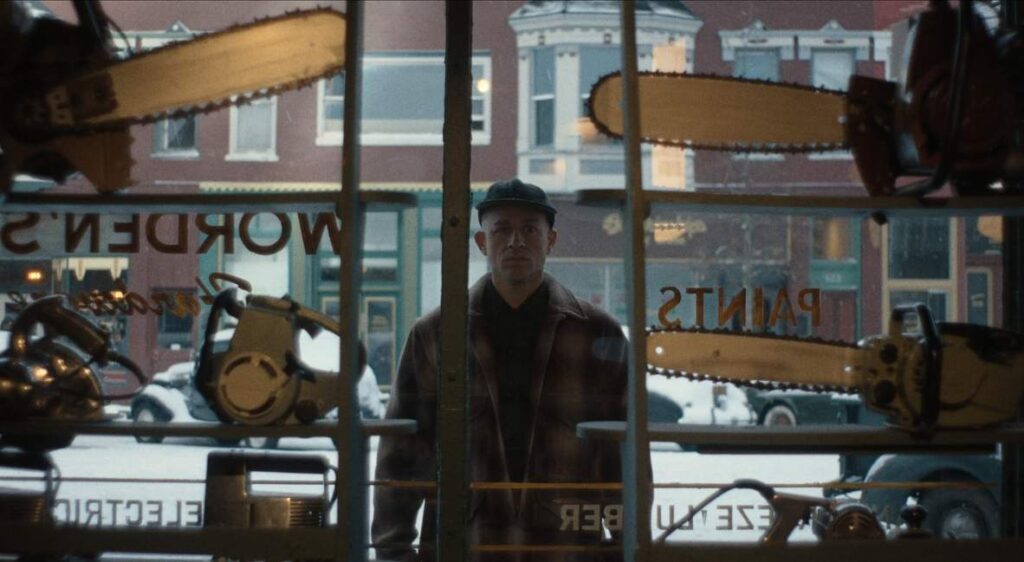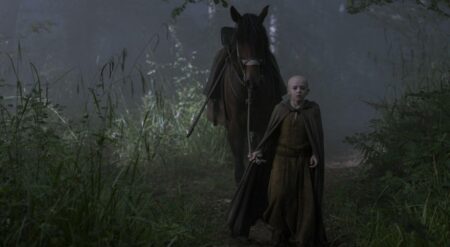Ryan Murphy’s anthology series, Monster, has achieved significant viewership on Netflix. Focusing on different brutal killings and how they happened, the next in this line is The Ed Gein Story. Grave robber and serial killer, the Butcher of Plainsfield has inspired many of horror’s most notable stories. And Monster: The Ed Gein Story draws on Hollywood history, a rumor-filled version of the past, and a star-studded cast to continue.
Set in the frozen fields of 1950s rural Wisconsin, a friendly, mild-mannered recluse named Eddie Gein (Charlie Hunnam) lived quietly on a decaying farm. With an overbearing mother who used religion to keep her boys in check, as Gein grows older, his violence and obsession with his mother, and women by proxy, takes a terrifying turn. By the time Ed Gein is caught, he has built a house of horrors so gruesome that, since its discovery, it has defined what an American nightmare is; he is horror.
Driven by isolation, psychosis, and an all-consuming obsession with his mother, Gein’s perverse crimes birthed a new kind of monster that would haunt Hollywood for decades. From Psycho to The Texas Chain Saw Massacre to The Silence of the Lambs, Gein’s macabre legacy gave birth to fictional monsters born in his image. At the same time, a cultural obsession with serial killers also emerged, and as the blueprint for Psycho, it became the foundation of horror as we know it today.
Ryan Murphy and Ian Brennan remain concerned with spectacle and rumor over history.
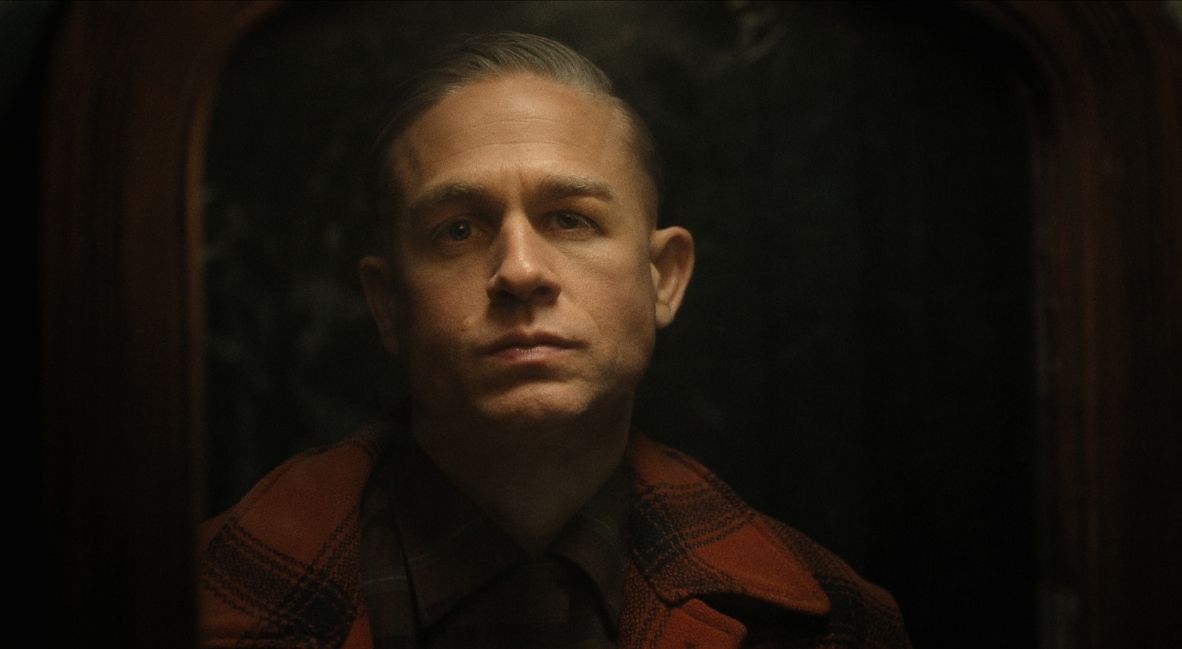
I can understand Ryan Murphy and Ian Brennan’s anthology series as a way to explore the questions of why bad people do bad things. Or, I can read it as the duo continuing to exploit victims for profit while establishing themselves as purveyors of a dark history. In Monster: The Ed Gein Story, they’re doing a bit of both.
At points, The Ed Gein Story is concerned with making Eddie Gein a sympathetic character whose shattered mind, left untreated, was abused by his mother and then turned into a killer. At others, it condemns him, but those moments are brief and quickly overtaken by sensationalization. By the end, the valorization in pop culture and among past serial killers who idolized him pales in comparison to the assertion that Gein was able to help stop one of America’s worst serial killers.
The assertion we made throughout Monster: The Ed Gein Story is that we make monsters. The ownership of his crimes is transferred to the people enamored with them and the horror productions inspired by him. At times, it gets too close to absolving him of his violence because of the world that made him. While Murphy loves opening this Pandora’s box, and has since his American Horror Story days, here, it hits a new concerning level.
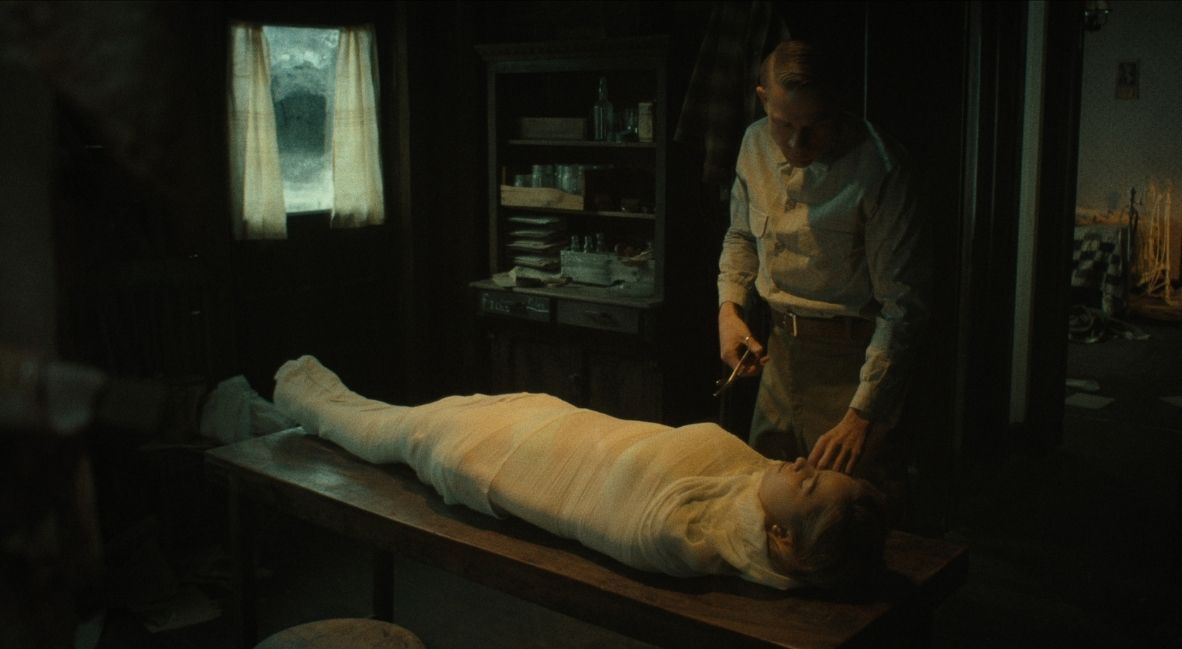
I don’t understand why we keep coming back to the true crime well. But even the true crime well is too generous a naming for what Ryan Murphy continues to produce with his Monster anthology series—even more removed from reality than the two past series, which focused on the Menendez Brothers and Jeffrey Dahmer, which is saying something.
Like the other seasons before it, Monster: The Ed Gein Story allows its main actor, Charlie Hunnam, in this case, to stretch his acting muscles. As Gein, Hunnam is transformed and takes on one of his most complex roles, both physically, when it comes to the change that his body undergoes, vocally adapting to different voices to showcase Gein’s shattering personalities, and thematically, of course. In his role, Charlie Hunnam excels and keeps you engaged.
Another highlight for Monster: The Ed Gein Story is the production design, costuming, and the use of practical effects throughout the series. It just looks good. Always visually interesting and in the last half of the series, nauseating when it needs to be, The Ed Gein Story is the strongest of Ryan Murphy’s productions. However, this limited series winds up crossing a different line of sensationalization than the other two.
Charlie Hunnam is unrecognizable as Ed Gein.
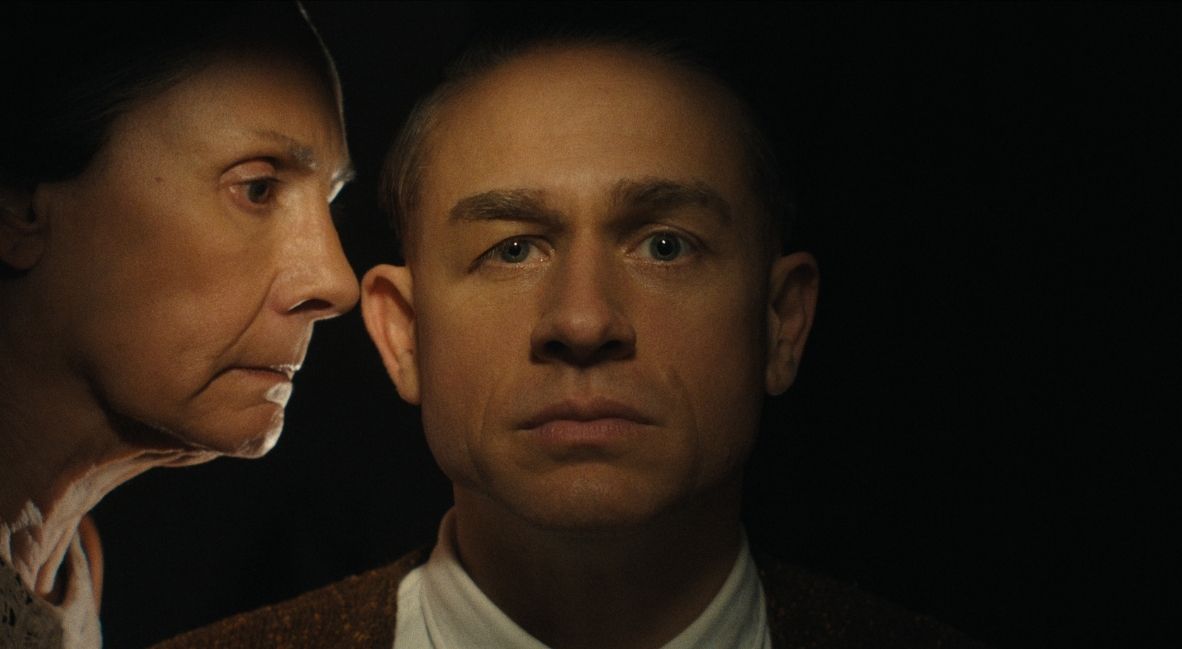
Monster: The Ed Gein Story continues the trend of this anthology series to disregard its victims, making up facts about them, and in this one, even establishing that one of them had a sexual relationship with Ed Gein. Additionally, the series relies on rumor over fact, never truly addressing the confirmed reality about Gein.
Instead, it focuses on the rumors and outright lies told to capitalize on his story as essentially the “first serial killer,” even including Gein’s relationship with Adeline (Suzanna Son), which is central to his development across the series. Conjecture and validation of inspirations mean more to the series than actually examining the events as historical.
Sensation over reality is what we’ve come to expect from any “based on a true story” series or film. Still, when you’re dealing with violence of this caliber, well, the responsibility of the adaptation is increased. And yet, the showrunners shirk their responsibilities and instead allow for the continued true crime fetish to fester.
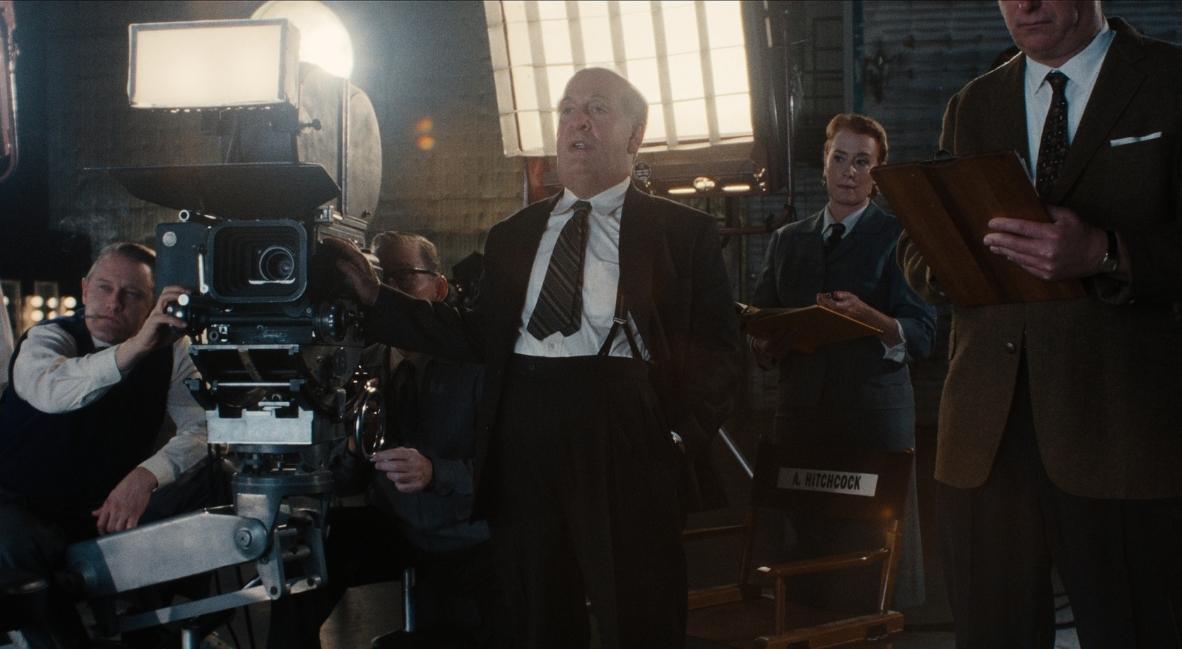
Add in the fact that the series then asserts that Ed Gein helped catch Ted Bundy (John T. O’Brien), and well, the final episodes of the series go beyond leaving a bad taste and instead enact willful apologetics for the man, as the series takes great pains to detail, inspiring a generation of depravity and violence from killers like Richard Speck and others. Gein is valorized while women are killed.
While Gein receives his schizophrenia diagnosis, letting the audience know that not all that we saw was real, other moments establish that some of the series’s most egregious liberties with the truth did happen within the context of the series. Embellishment is excessive, especially since Gein’s existing story has already been adapted and showcased in Hollywood, resulting in some of the most iconic horror movie moments. There is substantially more fiction than fact in The Ed Gein Story, so I have to ask why.
If anything, Monster: The Ed Gein Story does its best work when it recreates moments in film history, showcasing Psycho, The Texas Chain Saw Massacre, and The Silence of the Lambs. The moments where we see Ed Gein pulled through pop culture could have been a thoughtful critique, but instead, it’s a freakshow attraction that establishes a legacy without engaging with it beyond presenting Gein’s pride in it.
There is no denying that Monster: The Ed Gein Story is technically great, but it’s hard to validate its existence.
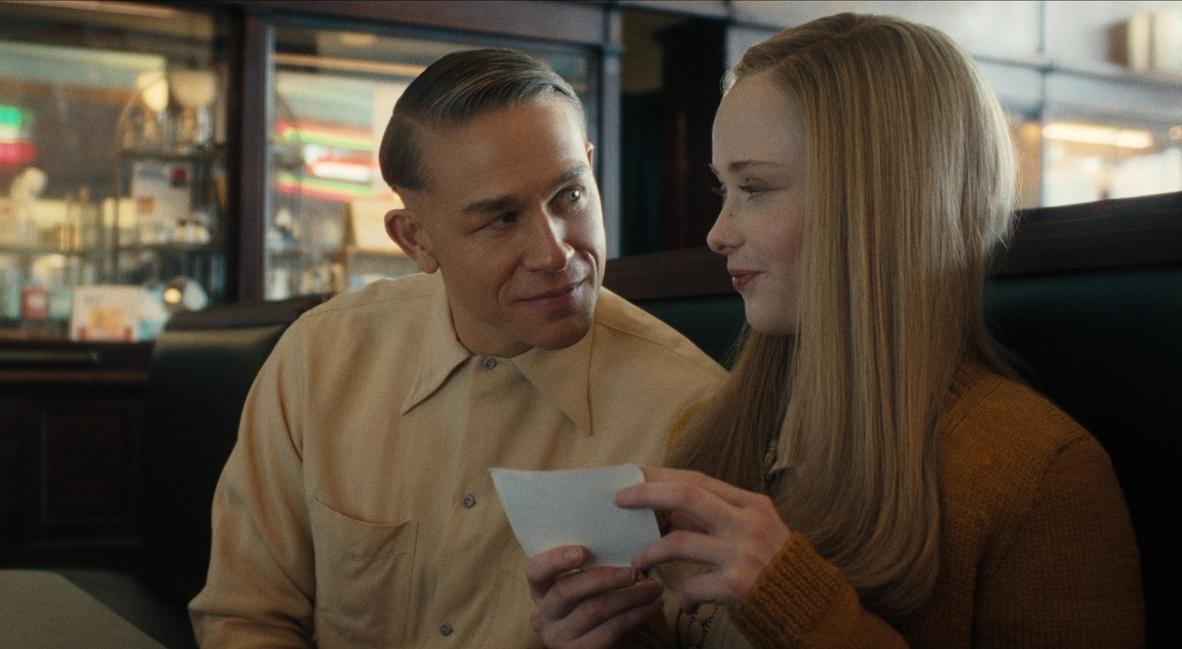
We have to ask: can we watch Monster: The Ed Gein Story, or the previous one in the anthology, or even consume true crime without giving in to the valorizing of the brutal men at the center? The exploitation we see just keeps growing, and the choice to paint Ed Gein with sympathy and rewrite his lonely death into one of “giving back to the world” without any critical eye winds up doing more damage than good.
And it’s a shame because when Monster focuses on the victims, as we saw in its inaugural season’s final episodes, and even here, when a spotlight is shown on Bernice Worden’s son in this season, it works. Up until his spotlight episode, Ed Gein’s crimes have been glimpsed at, shown in relation to the pop culture we know them through (even when fictional), and ultimately seen him as Eddie, a quirky, misguided man.
While the audience has seen how banal the dead are to Ed Gein, we know that he is robbing graves. We know that they are already dead, but with Worden (Lesley Manville), it’s presented as something different. The weight of Worden’s murder and the brutality that Gein enacts is shown on her son Frank Worden’s (Charlie Hall) face. We see the evil because Frank does, and that’s when the series gets close to tapping into honoring a victim. Only to throw it out for the series finale.
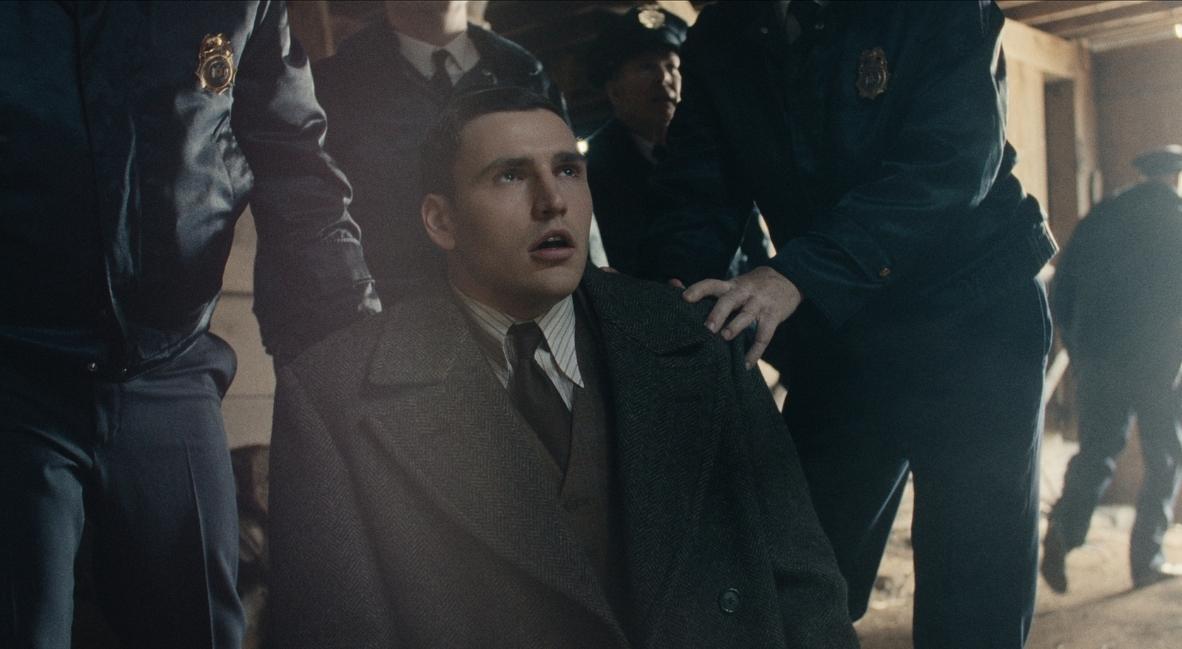
Charlie Hunnam may have thrown his all into his performance, but as the Monster series continues to chase Ryan Murphy’s obsession with serial killers that we first saw in his American Horror Story series, it’s just become too much. Monster: The Ed Gein Story edges on worship over storytelling, and having watched the series through for this review, I can’t help but feel worse about myself for doing so. But not even in an interesting way.
From a technical standpoint, I can’t take away the successes that we see in Monster: The Ed Gein Story. Charlie Hunnam, Laurie Metcalf, and Suzanna Son are a phenomenal cast, and the work done by the effects department, costumers, and production designers is what makes the series hard to ignore.
Still, this is an exercise in fetishizing killers that will make anyone engaging with it beyond the surface question whether this is something we need to continue humoring as a society. Ryan Murphy and Ian Brennan remain masters of visuals but novices when it comes to empathy for victims in Monster: The Ed Gein Story.
Monster: The Ed Gein Story is streaming now exclusively on Netflix.
Monster: The Ed Gein Story
-
Rating - 5/105/10
TL;DR
Ryan Murphy and Ian Brennan remain masters of visuals but novices when it comes to empathy for victims in Monster: The Ed Gein Story.

